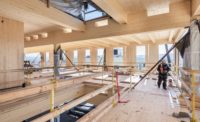Companies
As Katerra Reportedly Shuts Down, Scramble Ensues Among Team Members, Clients

The Catalyst Building in Spokane, Wash., was one green building project that Katerra and its subsidiary company Michael Green Architecture worked on. Many Katerra-related projects still underway are now in limbo.
Photo Courtesy of Katerra
Katerra, the Menlo Park, Calif.-based startup that sought to bring the myriad aspects of design, manufacturing and construction under one roof, is reportedly shutting down, according to media reports on June 1.
The company had shown signs of trouble in 2020, when the U.S. Securities and Exchange Commission began an investigation into its accounting practices. Projects that Katerra still has underway either as designer, builder or supplier are now in a state of uncertainty as project team members and owners make other arrangements.
News of Katerra's shuttering, first reported via anonymous sourcing in business news outlet The Information, says the company sent an email to employees on June 1 alerting that it would wind down most of its U.S. business operations and lay off much of its domestic staff. Katerra, which has offices across the U.S., as well as in India, China and the Middle East, reported having over 8,000 employees in 2020.
Katerra had seen significant growth in multifamily housing construction since its founding in 2015. The National Multifamily Housing Council ranked it as the 13th Top Builder in its 2021 rankings by units built, down from 5th overall in 2020. The company was also a major advocate of prefabrication and mass-timber construction.
Big Ambitions
The firm announced in early 2018 an $865-million new financing from a tech startup investor who sought to create what the firm said was an entity that was "redefining the construction industry." Katerra's founder Michael Marks had launched a PE firm and was CEO of a technology firm, but other key managers were former industry executives from firms such as engineer WSP, Kitchell Construction and architecture firm Miller-Hull.
Katerra had targeted the residential and hospitality market sectors, and claimed to have $1.3 billion in bookings at the time.
“Our goal is both feet-on-the-ground and executive-level talent who understand the construction industry has to change and are willing to help us do it,” Trevor Schick, head of Katerra’s construction, renovations and supply chain, told ENR in a 2019 article on tech-related industry acquisitions that included the firm.
Katerra received significant financial backing from the SoftBank Vision Fund, the venture arm of the Japan-based investment bank. SoftBank had previously made investments in WeWork, a real-estate-based startup that saw a failed IPO in 2019. Katerra has reportedly raised more than $2 billion in funding since its founding, mostly from SoftBank.
SoftBank invested in Katerra both through its Vision Fund as well as through Greensill Capital, a company on which SoftBank took a $1.5 billion write down earlier this year when it shut down.
Katerra announced a $200-million investment from SoftBank Vision Fund in May 2020, essentially giving it a controlling interest in the company. At that time Katerra COO Paal Kibsgaard took over as CEO from Katerra founder Marks. Like many firms over the last year, Katerra has reportedly suffered from supply and logistical problems related to the COVID-19 pandemic.
The investments by Greensill into Katerra is the subject of a dispute between the investment firm and Credit Suisse, which is preparing a lawsuit against SoftBank, according to reporting in the Financial Times on June 1. Specifically, Credit Suisse objects to the accounting practices that Greensill used in its supply chain financing operations, asserting that SoftBank used Greensill as a vehicle to inject money into Katerra without first paying its outstanding clients.
Credit Suisse declined to comment to ENR on the matter.
Fate Unknown
With reports that Katerra is suspending operations, the fate of many of its projects in the U.S. is unknown. Katerra has completed a number of projects and has several still ongoing, either directly involved or through firms it acquired in recent years, including designers Lord Aeck Sargent and Michael Green Architecture.
In a statement to ENR, Michael Green Architecture founder Michael Green said his firm had already planned for this contingency.
“MGA is healthy and busy and Natalie [Telewiak] and I remain in control of MGA as directors," he said. "We will now assume 100% ownership and are finalizing details on that front. We had been preparing for possibilities and just continue on business as usual with our great clients, projects and team."
MGA is well known for its design work on mass timber projects, an area of construction Katerra had come to focus on after acquiring the firm in 2018. In his statement, Green noted broader fallout for the wider Katerra ecosystem of companies. “This is sad for so many impacted and we feel for them all. We are grateful that MGA is solid and safe and excited about the diversity, meaning and impact of the work we are doing.”
In addition to its role as a designer and a builder, Katerra also was a supplier for projects, and has been providing cross-laminated timber from its sprawling factory in Spokane Valley, Wash. ENR has learned that this factory is now closing, and this disruption in the supply chain could severely impact multiple mass timber projects that were expecting Katerra’s CLT materials.
Opened in 2019, the 270,000-sq-ft factory is the largest such CLT manufacturing facility in North America, and at the time was hailed as a major step forward for mass timber adoption in the U.S. Mass timber construction has seen growth in the U.S., particularly in the Pacific Northwest.
The Founders Hall progressive design-build project at the University of Washington, Seattle is making extensive use of cross-laminated timber, with Katerra as a supplier. A spokesperson for project contractor Hoffman Construction Co. told ENR that the firm is "currently assessing whether or how Katerra’s work on the project will be affected by [its] announcement this week."
Katerra representatives did not respond to requests for comment by ENR press time.


